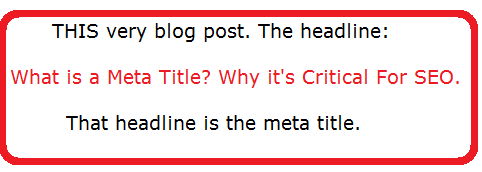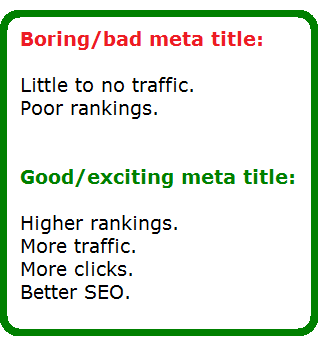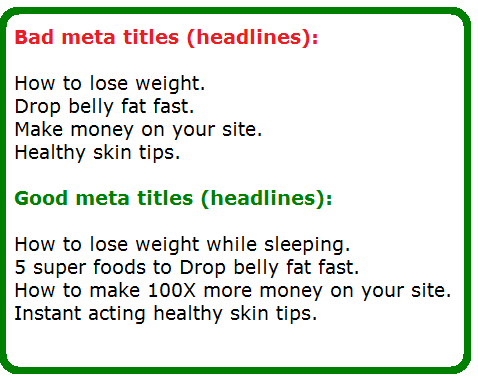If I write a blog post or add a new page to my website, the first thing I will be asked is to provide a headline for that. That is what the meta title is.
Contents
Here is a simple example of a meta title:

But beyond that simplicity is potential, and it has to do with SEO:
- If you can have a GOOD meta title.

- If you can also use a keyword with it.
- If you can provide good content with all of this.
Then through the power of Google and SEO, you can drive a lot of visitors to your site. This is what I will show you how to do, correctly.
You see, it’s taken me many years, many corrections and many missed opportunities to truly appreciate how important meta titles are. If I had known what I am about to teach you, I would have gotten MILLIONS of more visitors to my websites and made a lot more money than I currently have.
But while I made the corrections and learned the lessons I am about to teach you, I don’t want you going through the same mistakes I did, so let me explain just how important it is that you GET this subject as well as I do now:
Why meta titles are so important for SEO:
There’s a very simple example I’m about to show you:
Suppose 100 bloggers create a blog, whose topic is exactly the same, but the content within each written blog post is unique.
99 of these bloggers decide to use the same boring headline while the 100th blogger decides to make his a bit more attractive.
When all 100 of these bloggers publish their blog, and Google begins to crawl and see which of these blogs deserves to be ranked highest, there is a VERY high probability that the 100th person who decided to spice it up gets the highest position, and with that, the highest influx of traffic.
You see, the reason for this happening is because when people look for on Google for the content that those bloggers wrote about, they will be shown those blogs, but the person who has the best looking headline will be the ones which gets the most clicks and views, it will simply stand out above the other 99.
And as long as the 100th person who gets the most attention writes good content, the people who click on his blog to read it will provide positive feedback, that Google will then use to give that blog extra leverage in rankings.
What does this mean? It means more traffic.
Most people who create sites and blogs don’t understand how important this concept is.
If you can be that 100th person and utilize meta titles correctly (as well as other metadata that’s also connected to titles), you have the chance to hook the majority of eyes which will see that content and as long as you keep giving the eyes that clicked on your blog more reason to read that blog, you will only see more rankings and traffic from Google as a result.
I really can’t go any deeper into how important this whole thing is. I suppose someone who lost millions in potential visitors to his site would truly relate and understand the potential of what I’m talking about here, but perhaps I’m just too focused on my past failures…
How to make sure you get meta titles and SEO right:
The simple idea is that you need to start with…
A highly searched keyword.
As long as your headline includes a keyword which MANY people type into Google, there’s a great chance that Google will give your site a chance to appear for that keyword and get as many eyes as possible viewing it. Now don’t neglect how important this is.
I do not recommend that you ever write a new page or blog post on your site that doesn’t target a highly searched keyword. If you do, then odds are you will probably spend a lot of time writing content that never gets rankings for keywords which really matter for ranking, that being the ones which actually get searches.
But to really help this materialize…
You need to actually make the keyword better than it really is.
And it all happens in the meta title (a ranking factor). Take whatever keyword you found, but add more words to it to make that keyword sound and look better. Here are several examples that will speak for themselves:

I promise you that with strategies like these, you will really help improve the odds that Google gives your particular page/blog enough initial exposure for the keyword that enough audiences see it, click it and give you enough link juice to help it rank higher.
And as long as this rule is followed it with every new page/blog post you put out, you are going to really see more and faster traffic numbers coming into your site.
Again, go back to that example of the 100 bloggers. In connection with this tutorial, 99 bloggers are all targeting a highly searched keyword, but it’s that 1 other person who also targets it, but makes it look better in his headline that will succeed.
Note: Try to keep your headlines short. Long headlines generally do not get good SEO points.
And finally, beyond all of this, the content has to rock.
Meta titles are the hook to get people into the site, but then after that, the content you write is what will truly be the difference maker.
You need to analyze all this info I gave you from a point of view of someone who is walking around a street and seeing a store/restaurant they want to go into.
Once they do, the store/restaurant better have good stuff in it to give the person who entered a good excuse to stay.
That is exactly how you need to look at headlines and as a followup the content for it. If you can truly understand that, then you can truly experience the potential of high rankings in Google and the audiences it can bring in to your website.
Thanks for the helpful information on meta data. Of course I’ve always realized that you need a fitting title for your blogs or articles, but I need to keep in mind to make them a bit more flashy. Drop the modesty and spice things up a bit. It’ll take some practice, because it feels out of character for me. But I’d love to get my SEO in order and working for me, not against me.
Hi Bianca, I share the same trait you do. You should try to mix the flashiness of the title but also give it credibility within your content.
Your tips for making a good SEO meta title (headline) is very helpful. I am a little surprised that you said longer titles don’t rank well. This is the first I have heard this and I have to admit my titles are a bit lengthy most of the time.
I will work on making them shorter with catchy words. Thank you for the advice and important tips.
Hi Alexander, I suggested in a recent post to make your titles 60 characters or less. This is what my SEO mentors taught me and furthermore, if you consider the following scenario, it totally makes sense:
If you look at any website results on Google, you will note that there is a FINITE amount of space for the title to fit into the search results, so a page that has a longer title than the space can fit will look worse for the search results, meaning if you can fit it into that space, whilst making the title look good, and including the keyword you wish to include, it’ll be the best thing you can do.